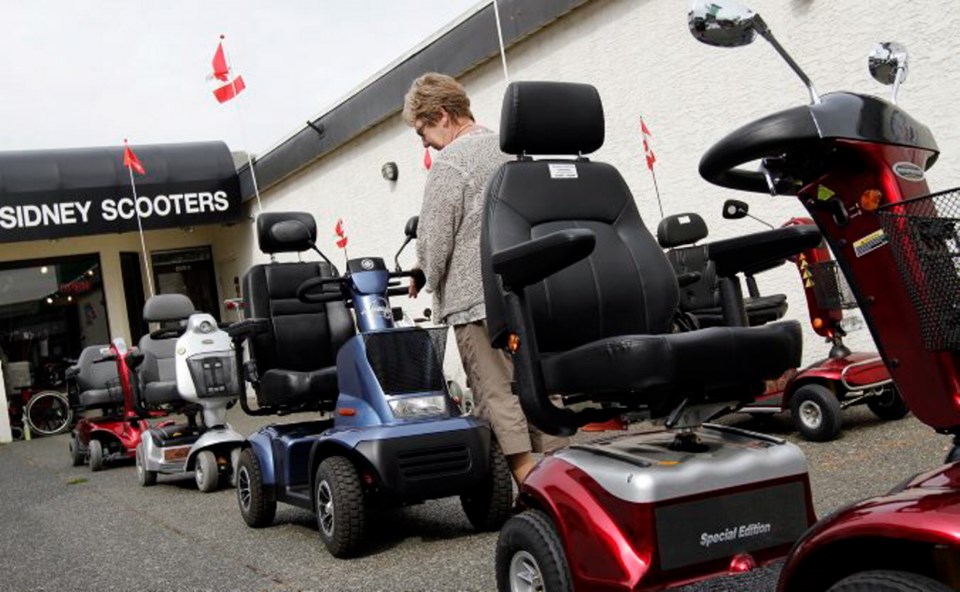Facing a backlash from disability advocates, Sidney Mayor Larry Cross moved Tuesday to clarify his town’s proposal to regulate the use of mobility scooters.
Cross said it was never Sidney council’s intention to deny people their right to mobility, but rather to protect the safety of everyone — pedestrians, motorists and scooter operators.
“The vast majority of scooter users use them safely,” he said. “However, there’s a subset — just as there’s a subset of automobile drivers — who do not use the vehicles safely at all times.
“So we’re concerned about setting up some basic guidelines or rules or something that kind of marks out the rules of the road — how you conduct yourself.”
Cross said the town is “not wedded” to licensing scooters, as the proposal states. “I’m not sure that’s the best way to go.”
He also said the town never intended to regulate wheelchair use. The original resolution to the Union of B.C. Municipalities focused on scooters, and was later expanded by the resolutions committee to include all motorized mobility aids, he said.
“That’s not ours,” Cross said. “I personally don’t support that. We have no problem with our motorized wheelchairs. Those people are trained to use them properly and they do.”
The resolution, which comes up for debate at the UBCM convention next month, sparked an uproar among disability advocates, who say regulations would discriminate against those who require the devices to remain active members of the community.
“This proposal is profoundly ignorant,” said Faith Bodnar, executive director of Inclusion B.C., in a release. “It threatens the right of people with disabilities to move around on their streets and communities as equal community members with those who walk, run, or bicycle.”
Cross said the proposal was developed in response to community concerns about safety, as well as liability issues.
“If a scooter travelling at a fairly high speed on the sidewalk hit somebody, and the pedestrian’s hurt, who’s liable and what’s the liability?” he said. “If a scooter came around the corner and hit a child in a stroller, for example, and the child was knocked out and seriously injured, now where do we go?
“I don’t want anybody hurt on the streets and sidewalks of Sidney.”
Cross said the main problem is that scooters can move faster than any pedestrian would walk. “So you’re constantly going through the crowd with a scooter, coming from a direction that the pedestrian can’t see you, in a machine that basically is very silent and is often without an alarm system or anything else.”
Pat Phillips, sales manager of Sidney Scooters, questioned the need for regulations, saying there have been relatively few incidents involving a small number of operators.
“To have to start getting into testing, just to drive scooters, well that’s a little over the top for me,” he said. “The people that I deal with and our clients seem to handle them fine. When we sell them, we give them some instruction about how to operate them.”
Phillips said any restrictions would limit people’s ability to get around. “Some people, that’s the only way they can move,” he said. “These people are usually trained by their occupational therapists whenever they get these units.”



